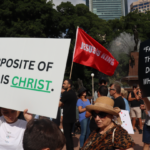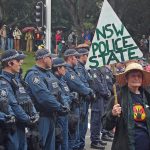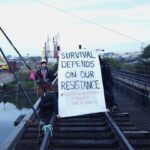Federal Greens Seek to Protect the Right to Protest Nationally by Neutralising State Laws

Australian Greens Senator David Shoebridge has reintroduced the Right to Protest Bill 2025 into the Senate, which serves to uphold the right to protest, via the overriding of state antiprotest laws, at a point in time when public assemblies are ever-increasingly under attack in this country, and when it has been demonstrated on the streets to be effectively shifting government policy.
The Right to Protest Bill 2025, which had been introduced earlier this year during the last parliament, appears anew directly after hundreds of thousands of constituents mobilised across the continent on Sunday 24 August 2025, calling on the Australian government to sanction Israel, and this came on the back of the 3 August 2025 Sydney Harbour Bridge march, which notably had a direct impact on federal politics.
State governments passing laws to suppress civil society voices mobilising on the streets is nothing new, but ever since the then NSW Perrottet government rolled out a set of draconian antiprotest measures in April 2022, such laws have become increasingly prevalent.
The initial laws were passed to end direct actions unapproved by NSW police, however under the Minns government, regular street marches are now under attack too.
The Greens legislation is drafted to protect all aspects of citizens’, residents’ and peoples’ rights to express their opinions on political matters vocally in public, which includes the right to hold opinion under article 19 of the International Covenant on Civil and Political Rights, the right to peaceful assembly under article 21, and the right to freedom of association under article 22 of the ICCPR.
These basic rights are currently under threat in the Australian setting like at no other time during the post-World War II period. And when these heightened attacks on the right to demonstrate on this continent began, it was all about putting an end to climate activists obstructing infrastructure, however, these days, the main offenders are those demonstrating for Palestine and beyond.
Protests shift government position
“A few short weeks ago, I joined 300,000 people to walk across the Harbour Bridge in a historic march for a free Palestine and an end to genocide,” said Shoebridge during his 27 August 2025 second reading speech on the bill. “In that moment, I saw solidarity and possibility for a better world. I saw people of all ages, all abilities, all backgrounds, uniting together… to end suffering in Gaza.”
“Like too many state and territory governments, NSW Labor sees protest, not as a fundamental right of our democracy, not as a human right, not as the most powerful tool for driving progress in societies,” Shoebridge continued, “they saw protest as a political problem” and would have “rathered we not march” – “they would have rathered our voices not be heard”.
The 3 August 2025 Palestine Action Group march across the Sydney Harbour Bridge shattered expectations and served as a foil to major party and mainstream media smokescreens conveying the official Israeli line, which seeks to hide the Netanyahu government’s mass commission of atrocities, and the mobilisation rather showed mass public opposition to the obscene mass murder in Gaza.
Sydney University academic Dr Nick Riemer told Sydney Criminal Lawyers that the Harbour march is key, as it presents a way forward for the Palestine solidarity movement. Riemer, the author of a book on the academic boycott of Israel, added that the Albanese government determined to recognise Palestine in a direct response to it, but he added that this move was a poor substitute to liberation.
State and territory authorities “want to keep power in the walls of parliament, in the offices of police commissioners they appoint, and they definitely want to stop power being exercised in our streets, in our workplaces, as we come together as people of conscience who care about the future,” Shoebridge, the Greens justice spokesperson, made certain.
Maintaining people power
The legislation’s explanatory memorandum sets out that despite criminal laws being the domain of the states and territories, it is the federal government that ratified the ICCPR and it bears the responsibility to uphold and maintain these civil and political rights across the entire continent, and therefore, it should move to protect the right to protest.
Australia is the only western democracy without national human rights protections enshrined in law in order to protect the rights of citizens and residents, and while the Albanese government went to great lengths to convey it might protect people’s rights in its first term, it would seem it is too preoccupied with sinking AUKUS submarines and shielding Israel from criticism to protect our rights.
The Greens bill creates the Right to Protest Act 2025. Proposed section 8 would enshrine that a “person has the right to engage in peaceful protest in a public place” in law. Section 9 would place restrictions on this right if a demonstration might threaten national security, public safety, public order, public health and the rights and freedoms of others. These only apply for “unacceptable risk”.
Section 10 of the Act would ensure that Commonwealth, state and territory laws that were “in force immediately before the commencement of this part, or enacted after that commencement” are of “no effect so far as it is inconsistent with this part”, while proposed section 11 bases the authority of these laws on the external affairs power, under section 51(xxix) of the Australian Constitution.
Ongoing NSW attacks
The NSW government heralded in the campaign of enhanced attacks on protest that the nation has seen rolled out in various states of late, with two new offences enacted on 1 April 2022, which together combined to prohibit the unauthorised obstruction of a list of major facilities, along with major roads, tunnels and bridges across Greater Sydney, Wollongong and Newcastle.
These were brought in because of a spate of disruptive direct actions by two sets of climate defence groups that were gaining traction at that time. These actions were always going to be unapproved by NSW police and could already result in minor criminal charges, but from that point on, such direct actions see a person facing up to 2 years imprisonment and/or a fine of $22,000.
Since these laws were established, there has been a strong civil society campaign against them, however despite this long-term and concerted pushback, the incumbent Minns Labor government has been raising issue with pro-Palestinian demonstrations since October 2023, and this has the broad support of the local Israel lobby.
The demonisation of pro-Palestinian protesters is a bipartisan campaign right across the country. And after NSW authorities had a shot at shutting down pro-Palestinian actions in this state, the Minns government determined to ban protests near places of worship and further created a move-on power for NSW police to direct people it considers are demonstrating “near” such places to leave.
Palestinian Action Group spokesperson Josh Lees has run a NSW Supreme Court challenge to the validity of this capacity for NSW police to move on protests close by places of worship, because, in Sydney, the proliferation of especially Christian churches across the cityscape basically ensures that police could, if officers sought to, shut down protests almost anywhere on Gadigal land in the CBD.
The court is still out on the place of worship move-on power.
“The right to protest is under assault in states and territories across the country,” Shoebridge further told the chamber on 27 August 2025. “That is having real impacts upon our democracy and our collective ability to come together to demand changes, to end unjust laws, to protect nature, to stand up for decency.”
“The environment and justice movements are increasingly under threat of legal sanctions and arrests for acts of nonviolent resistance for extractive industries, especially logging and fossil fuel,” the senator added. “So, today, we push back on this.”







